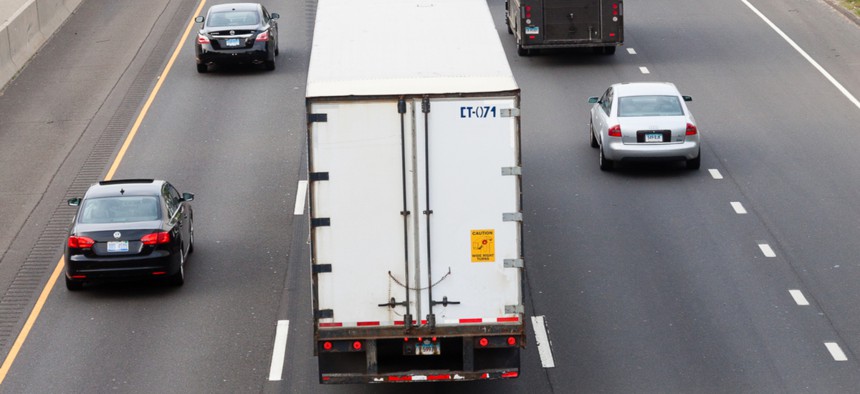In States Embracing More Toll Roads, Freeways May No Longer Be Free

Along Interstate 95 in Stamford, Connecticut Shutterstock
Some transportation officials are considering road-funding plans that were once unthinkable.
Transportation officials in Delaware are planning to open a 14-mile tolled highway on Thursday, a project that creates a new mainline route for U.S. 301, a heavily trafficked route often used by drivers and truckers to bypass congestion on Interstate 95 through the Baltimore area.
There won’t be any traditional toll booths along the new highway. All tolls will be collected electronically, with an camera-equipped overhead gantry reading a driver’s EZ-Pass device or scanning the license plate to initiate billing the vehicle’s owner by mail.
As the Delaware News Journal reported Wednesday, for the full 14-mile trip, a two-axle car will be charged $5.60; a six-axle truck will be charged $14.40. The state forecasts that truck tolls will account for 56 percent of toll revenues.
While building a new tolled highway isn’t necessarily a controversial concept—roads don’t pay for themselves, after all, and gas taxes haven’t kept up with state infrastructure needs—there’s a different tolling approach more states are looking at that is far more controversial: Bringing tolls to currently free interstate highways.
While the federal Interstate Highway System does have some tolled sections, those were primarily state-built turnpikes and tollways that predated the creation of the Interstate Highway System in 1956. Federal restrictions kept freeways, well, free of tolls.
On Wednesday, anti-tolling protesters gathered in Hartford for Connecticut Gov. Ned Lamont’s inauguration to voice their opposition to proposals to bring tolls to interstate and state highways in the Nutmeg State.
During his campaign for governor, Lamont, a Democrat, said he supported a tolling plan that would only impact trucks. But during his transition, a transportation advisory panel recommended a tolling proposal that also includes passenger cars.
Patrick Sasser, an anti-tolling protest organizer, told the Stamford Advocate this week: “He told everybody he’ll just toll heavy trucks, but the study that came out after the election said passenger cars need to be tolled as well. I think most people don’t know that. We want to bring attention to it.”
Melissa Kaplan-Macey, who co-chaired the advisory panel, told the Hartford Courant in December: “We recognize that the tolling conversation isn’t easy, but we agree that it is a hard conversation that our state needs to have.”
That conversation is one that continues in Virginia, too.
Democratic Gov. Ralph Northam and state legislative leaders this week announced their support for plan to bring tolls to Interstate 81, a heavily trafficked, crash-prone route used by many truckers heading between Tennessee and the mid-Atlantic through the Shenandoah Valley and southwestern Virginia.
According to the governor’s office, the initial draft legislation would establish an Interstate 81 Corridor Improvement Fund supported by toll revenue and establish toll rates, including an option for automobiles and small trucks to purchase an annual pass for I-81 for a fixed yearly fee. Revenue from the I-81 tolls would also only be used for improvements along the corridor as previously identified and adopted by the Commonwealth Transportation Board in December.
According to the Roanoke Times, specific locations for toll-collection gantries have not yet been identified, but the Virginia Department of Transportation has recommended that they be at least 40 miles apart between urban areas along the corridor.
The plan comes after a year-long study of possibly bringing tolls to I-81 to fund improvements and has bipartisan support.
“We have a tremendous opportunity to address longstanding issues on the I-81 Corridor,” State Sen. Mark Obenshain, a Republican from Harrisonburg, said in a statement. “I will continue to work with the Northam administration and with my colleagues in the General Assembly in hope that we can find bipartisan solutions to the critical reliability and safety issues in this region of the Commonwealth.”
But opposition has come from the Virginia Truckers Association and the Alliance for Toll-Free Interstates, the Roanoke Times reported.
Though bringing tolls to currently free interstates has been something that’s been studied and debated for decades, the federal government has been opening the door to the approach in recent years, winning support from the Obama administration and now the Trump administration.
Indiana is also studying the possibility of bringing tolls to its free interstates, including sections of I-70, I-65 and I-94.
North of Indiana is Michigan, which was recently named by a team of Tesla engineers as the state with the worst roads and has a new governor, Gretchen Whitmer, who campaigned on the slogan “fix the damn roads.”

The question as Whitmer’s administration gets situated in Lansing: Can Michigan fund its road-fixing needs without tolling them?
Her predecessor, Republican Rick Snyder, said at a public forum in 2013: "We made a decision a long time ago, back in the Eisenhower days when we did the Interstate system, that we weren't going to do toll roads," MLive reported at the time.
A survey released last May by AAA Michigan confirmed the obvious—a vast majority of respondents in the state rated the conditions of roads in the state as fair to poor—and acknowledged the political difficulties of proposing charging users more to use the roads. WXYZ reported at the time: “While most people think there isn't enough money [to fund roads in Michigan], a majority also do not want to pay more in taxes and fees. According to the study, 60 percent of people said they wouldn't be willing to pay more in taxes or fees to support fixing the roads.”
But with state and federal gas tax revenue failing to keep up with the nation’s infrastructure needs, don’t expect the idea to expand tolling—including to interstates that are currently free—to go away anytime soon.
Michael Grass is Executive Editor of Route Fifty and is based in Seattle.
NEXT STORY: Boston Looks to Shore Up Its Harbor Against Flooding in 2019






